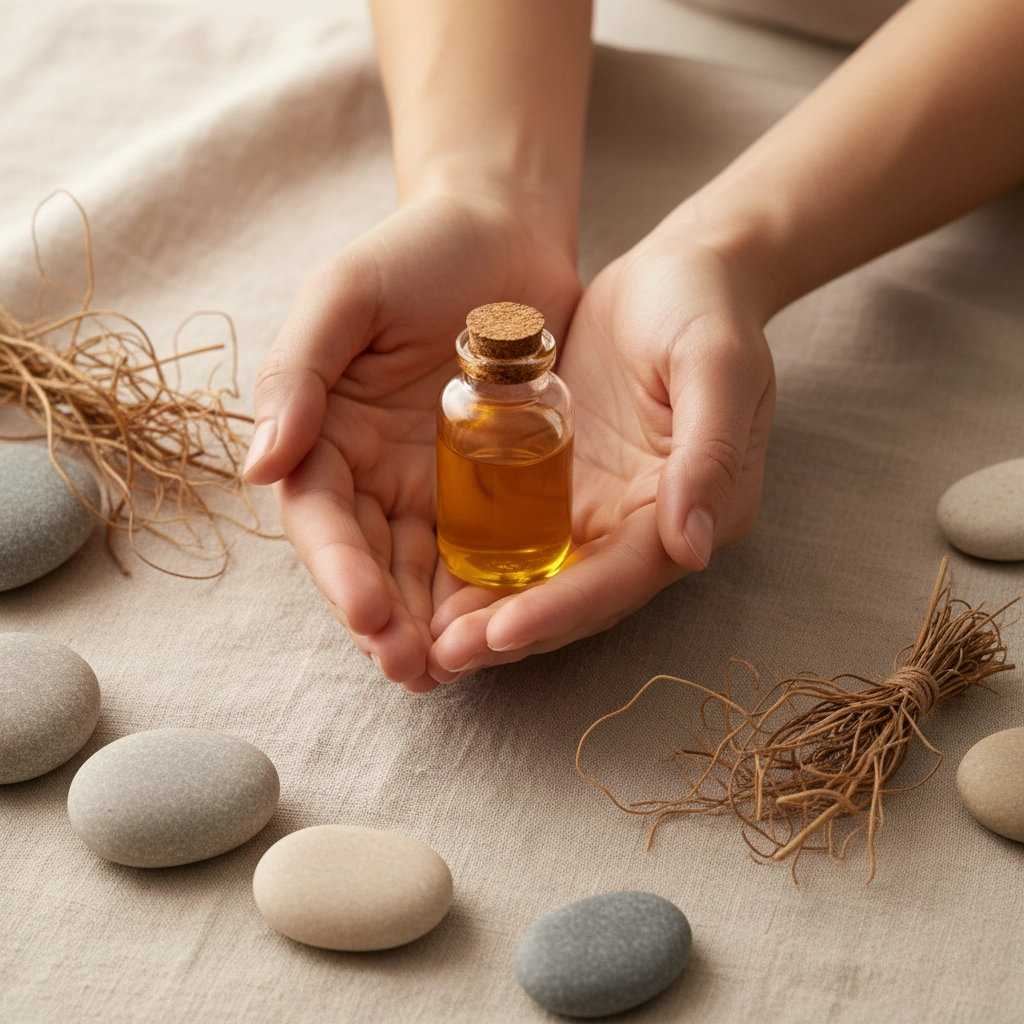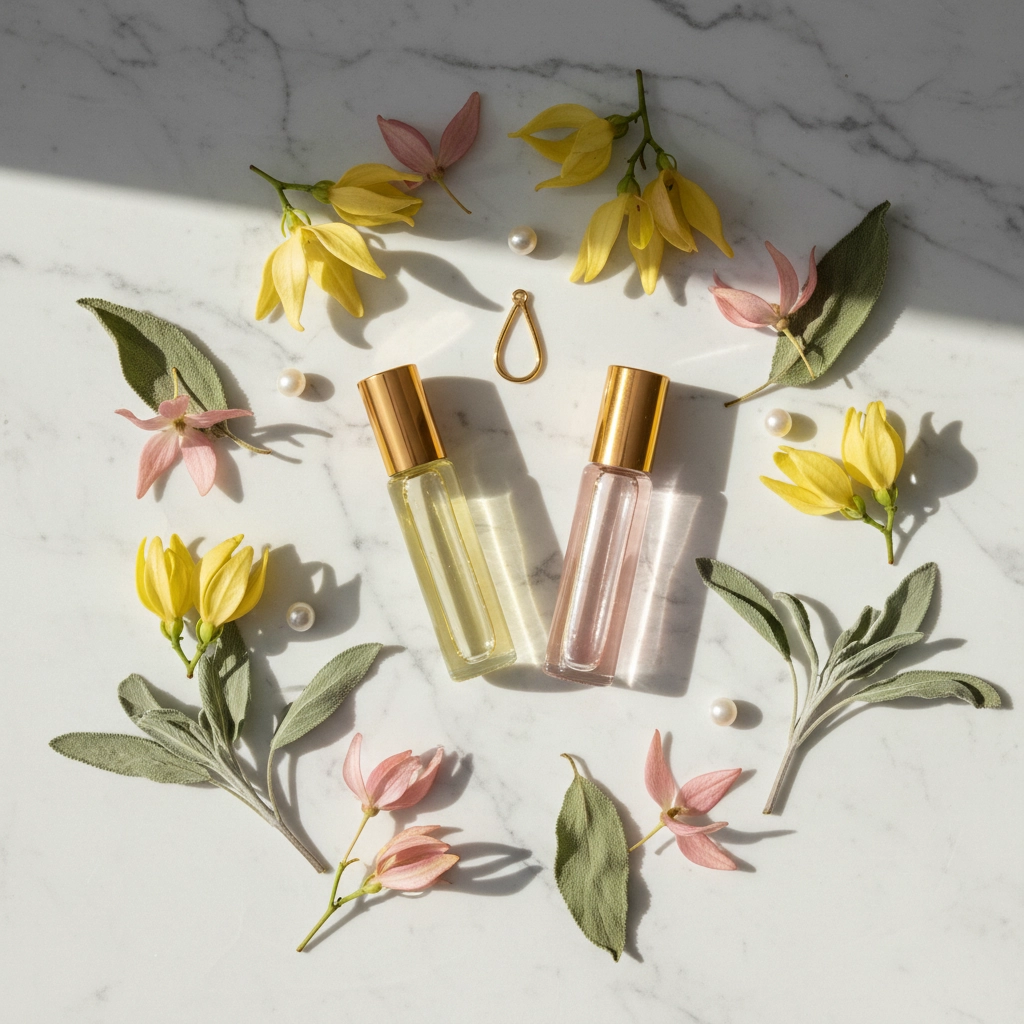Essential Oils for PTSD: 5 Trauma-Informed Ways to Support Your Healing Journey
Posted by shabranae patton on
Living with PTSD can feel like your nervous system is constantly on high alert, scanning for danger, braced for impact, never quite able to settle into safety. As someone who understands this journey intimately, I want you to know that you're not alone, and there are gentle, natural ways to support your healing process.
Essential oils work directly with your brain's limbic system, the area where trauma gets stored and where your fight-or-flight responses originate. When we breathe in these powerful plant compounds, they bypass the thinking brain and speak directly to the parts of us that need the most healing. This isn't about quick fixes or miracle cures, it's about creating moments of peace, building resilience, and reclaiming your sense of safety one breath at a time.
Here are five trauma-informed approaches to using essential oils that can gently support you on your healing journey.
1. Ground Yourself in the Present Moment with Vetiver
When trauma memories surface or dissociation kicks in, vetiver oil can be your anchor back to the present. This earthy, deeply grounding oil has a unique ability to help you feel connected to your body and the here-and-now.
Vetiver works by promoting emotional balance and helping you process difficult feelings without becoming overwhelmed by them. Its rich, soil-like aroma creates an immediate sense of stability, like having your feet firmly planted on solid ground.
How to use it: Apply a drop of vetiver to the indent on the bottom of your foot where the pads meet, or to your inner wrists. You can also keep a small bottle in your pocket for moments when you need to ground quickly. As you breathe it in, remind yourself: "I am here. I am safe. This moment is real."
The beauty of vetiver is that it works both physically and emotionally. While you're inhaling its stabilizing scent, you're also giving your nervous system permission to slow down and remember that you're no longer in danger.

2. Create Calming Rituals with Peppermint for Trigger Management
Peppermint oil might surprise you as a PTSD support, many people think of it as energizing, but it's actually incredibly effective for managing anxiety and creating mental clarity when triggers arise. The cooling sensation and sharp, clean scent can help interrupt the cascade of panic before it fully takes hold.
Research shows that peppermint oil activates the parasympathetic nervous system, which is responsible for your body's "rest and digest" response. When you're triggered, your sympathetic nervous system floods your body with stress hormones. Peppermint helps shift you back into a calmer state.
How to use it: Create a simple "reset ritual" by keeping a small bottle of diluted peppermint oil with you. When you feel a trigger coming on, place a drop on your temples or under your nose and take five deep breaths. The ritual itself becomes a signal to your nervous system that you're taking control and caring for yourself.
You can also add a few drops to a cool washcloth and place it on the back of your neck or wrists. The combination of the cooling sensation and the scent can help you feel more present and less overwhelmed.
3. Support Deeper Sleep with Lavender and Bergamot
Sleep disturbances are one of the most challenging aspects of PTSD, nightmares, hypervigilance, and racing thoughts can make rest feel impossible. Lavender and bergamot work together to create the perfect conditions for restorative sleep.
Lavender has been used for centuries to calm the nervous system and ease anxiety. It's particularly effective for the shock responses that can happen after traumatic events, and its gentle floral scent signals to your brain that it's safe to relax. Bergamot, a citrus oil with research backing its effectiveness for PTSD symptoms, helps reduce the avoidance behaviors that can keep you tossing and turning.
Recent studies with first responders and military personnel found that bergamot not only improved sleep quality but also enhanced concentration and reduced anxiety during the day.
How to use them: About 30 minutes before bed, create a calming atmosphere by diffusing lavender in your bedroom or adding a few drops to your pillow. You can also blend lavender with bergamot in a small roller bottle with a carrier oil and apply it to your wrists and behind your ears as part of your bedtime routine.
Consider this your permission to make sleep a sacred practice. Your healing happens when you rest, and these oils can help you reclaim the peace that trauma tried to take away.

4. Build Empowering Daily Practices with Ylang Ylang and Clary Sage
Anger, irritability, and emotional overwhelm are normal parts of the PTSD experience, but they can feel frightening and out of control. Ylang ylang and clary sage offer gentle support for emotional regulation without numbing your feelings or making you feel disconnected from yourself.
Ylang ylang's sweet, exotic fragrance naturally boosts serotonin production, your brain's "happiness chemical." It helps calm hyperactive emotions while still allowing you to feel and process what's coming up. Clary sage complements this by offering antidepressant properties and helping with the hormonal imbalances that trauma can create.
How to use them: Create a daily "emotional check-in" ritual. Each morning or evening, take a moment to notice how you're feeling without judgment. Apply a blend of ylang ylang and clary sage to your pulse points, take three deep breaths, and set a gentle intention for your day or evening.
This isn't about forcing positive thinking, it's about creating space for whatever emotions are present while giving your nervous system tools to stay regulated. Some days you might feel angry, sad, or numb, and that's okay. The oils simply provide a supportive container for whatever arises.
5. Establish Safety Through Personalized Scent Anchors
One of the most powerful aspects of essential oils for PTSD recovery is their ability to create positive anchors, scents that your brain associates with safety, love, and healing. Just as certain smells might trigger difficult memories, you can intentionally create new scent memories that support your wellbeing.
Consider working with a qualified aromatherapist or consulting with someone knowledgeable about essential oils to create personalized blends that speak to your specific needs. This might include chamomile for worry and depression, rose for grief and panic, or frankincense for overall nervous system support.
How to use this approach: Choose one scent or blend that feels particularly comforting to you, maybe it's the Tonka Bean Cashmere candle from our collection or a custom blend you create. Use this scent during moments of self-care, meditation, or any time you feel genuinely peaceful and safe.
Over time, your brain will begin to associate this scent with feelings of safety and calm. When you encounter it later, even during difficult moments, it can help remind your nervous system that you have the tools and strength to navigate whatever comes up.

Moving Forward with Gentle Intention
Essential oils aren't a cure for PTSD, and they're not meant to replace professional therapy or medical treatment. They're simply gentle allies on your healing journey, tools that can support the incredible work you're already doing to reclaim your life.
Remember that healing isn't linear, and there's no timeline you need to follow. Some days these practices might feel like lifelines, and other days you might not need them at all. Both are perfectly normal.
As you explore these approaches, pay attention to what resonates with you. Your body and nervous system are incredibly wise, and they'll guide you toward what feels most supportive. Trust that inner knowing, it's one of the most powerful tools you have.
If you're interested in learning more about how essential oils can support trauma recovery, I encourage you to explore our other resources, including our post on aromatherapy and trauma healing with peppermint.
Most importantly, please be gentle with yourself. You're doing something incredibly brave by choosing to heal, and every small step you take matters more than you know. You deserve peace, safety, and all the beautiful moments that are waiting for you on the other side of this journey.
Important note: Before incorporating essential oils into your healing routine, please consult with your healthcare provider, especially if you're taking medications or receiving treatment for PTSD. Essential oils are powerful and should be used as a complement to, not a replacement for, professional care.
Share this post
- 0 comments
- Tags: Aromatherapy, essential oils
